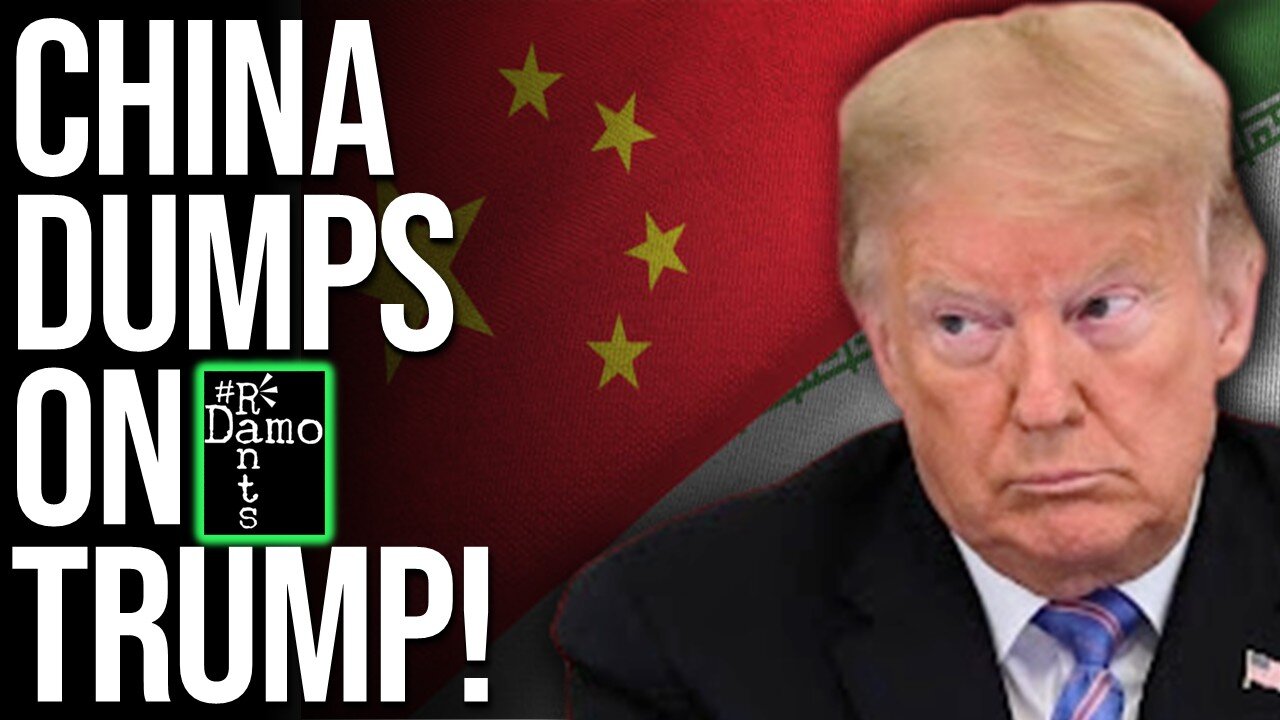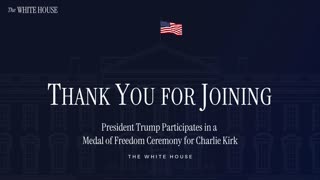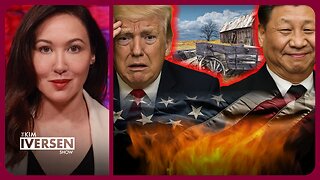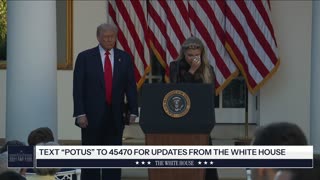Premium Only Content

China has Found a Way to Bypass US Sanctions on Iran – And Trump is Having a Meltdown!
Right, so it’s almost impressive, really — the way Washington keeps mistaking stubbornness for strategy. for years, the US. has sanctioned half the planet, convinced that the threat of being cut off from its money would bring governments around the world to heel. But the rest of the world has learned a different lesson: how to live without America’s permission. So in that vein, China and Iran have just turned those tiresome US sanctions into an all new business model — trading oil not for dollars, but for infrastructure and making the so-called “rules-based order” look more like a museum exhibit everyone is bored of seeing. Europe, ever eager to moralise while arming war criminals, has joined in with its own theatrical “snapback” sanctions on Iran too, proving only that hypocrisy is now a shared currency with the US. Donald Trump’s empire wanted to punish its enemies, but it’s ended up teaching them how to replace it instead.
Right, so for decades, Washington has relied on sanctions as its primary instrument of foreign policy. Bully others into submission. What began as a targeted economic penalty for specific breaches of international law, as sanctions were introduced to do, has evolved into an almost automatic reflex — the go-to tool whenever persuasion failed or diplomacy required domestic cover. Iran, Russia, Venezuela, Cuba, China: all have lived under that system of economic restriction. Yet the repetition of the tactic means it has become ever more meaningless and those states constantly hit with it, have ending up adapting to it.
Donald Trump’s return to the presidency has amplified this addiction. His administration has sought to re-impose the logic of “maximum pressure” on Iran — the campaign he first launched in 2018 when he withdrew from the Joint Comprehensive Plan of Action. The idea was simple: cut off Iranian oil exports, freeze its access to global finance, and wait for economic collapse to deliver political compliance. It failed then and it is failing again, for one simple reason. The rest of the world has stopped structuring its trade around Washington’s permission.
Two states, China and Iran, have demonstrated this more clearly than anyone right now and its got Trump’s toupee in a right frazzle. They have built a trade architecture that works entirely outside the reach of US oversight. It moves oil, technology, and infrastructure through channels that cannot be blocked because they do not pass through the dollar system. Their cooperation is not an act of defiance for its own sake; it is a rational response to two decades of economic coercion that left them with no alternative. Every sanction meant to isolate Iran instead forced it into a deeper partnership with China — and that partnership has now stripped Washington of its leverage. And now in 2025 the results are more and more visible: Iran is exporting more oil than at any point since before the Trump sanctions, and China is paying for it through a barter mechanism that makes enforcement practically impossible.
China now purchases billions of dollars’ worth of Iranian crude through a covert barter system. Instead of wiring money through Western banks, Chinese state-linked companies fund infrastructure projects inside Iran — roads, power plants, industrial zones, telecoms — in exchange for oil. The system functions entirely outside the dollar clearing network. It leaves no financial trail for the US Treasury to track, no SWIFT code to intercept, and no bank transfer to freeze. The oil moves east; the equipment and expertise move west; the books balance without a single dollar changing hands.
And independent analysis has confirmed the scale that Iran and China are operating on. By the middle of this year, Iranian crude shipments to China averaged around 1.46 million barrels per day and peaked near 1.8 million. Close to ninety-five percent of Iran’s total exports now go to China. Tehran’s isolation from Western markets has become an advantage: a stable, discounted supply chain for the world’s second-largest economy and a guaranteed buyer for Iran. The trade is conducted through a network of smaller “teapot” refineries in Shandong province, many of which operate below the radar of international monitoring agencies. These refineries pay in kind rather than cash, using Chinese goods or construction credits. It is not a loophole; it is a whole parallel economy.
To move that volume of oil under sanction, logistics had to evolve. Tanker traffic analysts refer to a “dark fleet” — hundreds of vessels that disable transponders, switch flags, and conduct ship-to-ship transfers in the Gulf of Aden and the South China Sea. Various outlets have documented how these vessels alter ownership on paper to disguise origin, Iranian oil being passed of as Malaysian for instance. The practice is technically illegal under shipping law, but it is also effective. Each additional layer of disguise makes the burden of proof for US prosecutors heavier. Sanctioning a ship or a captain is symbolic when the cargo is already refined and sold.
China and Iran have achieved something Washington long assumed impossible: a durable commercial ecosystem immune to US secondary sanctions. The structure is decentralised, technically deniable, and economically sound. It relies on mutual dependence rather than ideology. Iran needs stable demand; China needs cheap, steady energy. The sanctions regime forced them into partnership, and the partnership now weakens the regime.
The numbers alone expose the collapse of Trump’s bullying and heavy-handedness. When the administration reinstated sanctions in 2018, its goal was to drive Iranian oil exports to zero. In 2025, despite another round of penalties and the threat of secondary sanctions against buyers, exports remain around 1.6 million barrels per day. Even conservative Western sources such as the Foundation for Defense of Democracies acknowledge that the campaign has failed to reduce revenue. Instead, it has locked Washington into a cycle of escalation without effect. It’s like the teacher who likes to shout in the classroom. It takes just one kid to shout back and all of a sudden it’s a case of who can shout loudest and what happens when the teacher cannot shout any louder? They lose all authority.
It was reported back in that Trump had threatened to sanction “any country” buying Iranian oil, implying punitive action against China. It was an empty threat. Beijing is too central to global trade to isolate; sanctioning it would risk a financial crisis. But by June, Trump’s tone shifted. He was quoted as suggesting the United States might “ease enforcement” of certain oil sanctions to allow reconstruction in Iran — a tacit admission that coercion had produced neither compliance nor collapse. Treasury officials concede that enforcement depends on cooperation from shipping insurers and financial intermediaries that increasingly prefer to look the other way.
Even the economic logic of sanctions has reversed. Every restriction now raises global energy prices, indirectly benefiting Iran through higher margins on the barrels that still reach market. Discounts to Chinese buyers — sometimes as steep as fifteen dollars below Brent — keep the trade competitive without making it unprofitable. Just last month it was reported that Chinese crude inventories reached record highs even as US restrictions tightened. The demand never disappeared; it simply stopped being visible to Western accounting.
Each round of sanctions drives more countries to explore non-dollar trade, more firms to design compliance workarounds, and more governments to question whether aligning with Washington’s enforcement is worth the risk. The sanction, once a deterrent, has become a catalyst for adaptation instead.
While Washington grapples with its own ineffectiveness now, Europe has doubled down on the moral theatre. The governments of France, Germany, and the United Kingdom — the so-called E3 — invoked the “snapback” mechanism of UN Security Council Resolution 2231. That mechanism allows participants in the nuclear agreement to restore all previous UN sanctions on Iran if they claim Tehran is in breach of its commitments. The E3 justified the move by citing Iran’s enrichment of uranium beyond JCPOA limits and restrictions on IAEA access. This was presented as a defence of the rules-based order, but in reality, it was an act of political conformity with US pressure, the E3 still very much saying how high when Trump tells them to jump.
The hypocrisy is glaring. Two months earlier, Israel had carried out airstrikes on Iranian nuclear sites, destroying civilian infrastructure and killing technicians. There was no European censure, no sanctions on Israel, and no discussion of proportionality. Yet when Iran continued enrichment in response, Europe re-imposed the very sanctions lifted in 2016. The Iranian reaction was succinct: “illegal, illegitimate, and devoid of moral credibility.” The timing also exposes Europe’s desperation. The authority to trigger snapback under Resolution 2231 expires this month. The E3 acted not out of conviction but out of fear of losing a procedural tool.
For European governments, the decision satisfies domestic and transatlantic optics. It signals loyalty to Washington while costing little politically. But the strategic effect is the opposite of what they claim to intend. Iran has concluded that negotiation with the West is pointless. Its focus has shifted entirely to economic integration with Asia — the Belt and Road Initiative, the Shanghai Cooperation Organisation, and BRICS+. By choosing sanctions over diplomacy, Europe has accelerated the very geopolitical realignment its afraid of.
The United States still wields enormous influence, but its instruments of coercion are increasingly self-defeating. The barter system between China and Iran is not merely a workaround; it is a prototype for future trade among states that expect to be sanctioned sooner or later. Russia already uses a similar mechanism to move oil through third-party traders. Venezuela swaps crude for food and medicine. Even US partners in the Gulf now experiment with non-dollar settlements. The sanctions architecture is dissolving, not through rebellion but through irrelevance due to overuse and illegitimacy.
For Iran, the sanctions era has become an unintentional industrial policy. Domestic refineries have expanded; petrochemical output has diversified; and new export corridors through the Caspian and Central Asia have opened. Each restriction forces internal substitution and technological improvisation. Iran’s oil infrastructure has survived repeated cyber-attacks, sabotage, and bombardment, yet production remains steady. Necessity has delivered resilience.
China’s role is equally pragmatic. It receives discounted energy and gains political leverage as the indispensable buyer of last resort. Its construction firms secure long-term contracts across Iran’s transport and energy sectors, extending Beijing’s strategic footprint from the Persian Gulf to the Mediterranean. This is not charity; it is state-backed calculus. Every pipeline and railway built under these barter deals ties regional logistics more tightly to Chinese supply chains. The same system that frustrates US sanctions enforcement simultaneously builds the infrastructure of a post-Western trading order.
The collapse of “maximum pressure” is not only a policy failure; it is a crisis of perception. Trump’s foreign policy is built on the performance of dominance. Sanctions are the stage on which that performance takes place. When they stop working, that image of omnipotence collapses with them. That is why Trump’s reaction has been a mixture of rage and denial. Publicly, he threatens further penalties. Privately, his advisers acknowledge that enforcement is largely just symbolic.
Trump’s pledge back in May to sanction every importer of Iranian oil was intended to project strength. Instead, it exposed more of his weakness. Beijing ignored him; other Asian buyers quietly expanded purchases through intermediaries. The threat of exclusion no longer frightens when the world’s second-largest economy sits outside the enforcement system.
Within the United States, sanctions function as political shorthand for toughness. They allow presidents to appear decisive without deploying troops. For Trump, who defines politics as spectacle, the image of punishment is more important than its outcome. Each new blacklist or Treasury announcement is a media event, not an act of strategy. The contradiction is obvious: sanctions that fail abroad still succeed at home as theatre.
Every repetition erodes credibility. Foreign governments learn through experience that Washington’s penalties are survivable. Once the aura of fear disappears, the deterrent value is gone. The empire’s coercive currency devalues through overuse, much like its financial one.
The deeper question therefore is structural: what happens when sanctions stop working? The answer is already unfolding. The erosion of US financial dominance is producing a fragmented world economy with multiple centres of settlement and exchange. China and Iran are the most advanced example, but they are not unique. Russia’s energy trade with India is now largely settled in rupees and yuan. Saudi Arabia has experimented with yuan-denominated oil contracts. The BRICS bank offers credit lines that bypass Western institutions altogether. Each of these innovations weakens the enforcement capacity of US sanctions.
The barter trade between Beijing and Tehran also demonstrates a psychological shift. States once feared being cut off from Western systems; now they plan for it. They build redundancy into their financial architecture, diversify currency reserves, and cultivate local manufacturing. Sanctions no longer isolate; they incentivise autonomy. What was meant as punishment has become preparation.
For Washington and Brussels, this trend represents a strategic dilemma. To maintain sanctions credibility, they must show results; to achieve results, they must escalate. Yet escalation drives further innovation among targets. The cycle is self-perpetuating and self-defeating. Every attempt to enforce dominance accelerates the emergence of a world no longer governed by it. The policy meant to bring Iran to its knees has instead brought Washington’s authority to its own.
Beyond economics lies the moral reckoning. The sanction was once defended as a humane alternative to war. Today it functions as collective punishment. When the E3 re-imposed sanctions on Iran, they did so in the same political moment that Israel continued its assault on Gaza with Western-supplied weapons. The contrast is indefensible. Iran faces penalties for alleged violations of a nuclear accord it no longer benefits from. Israel faces none for mass killing, starvation blockades, and defiance of International Court of Justice orders. The selective application of law has destroyed the claim of moral leadership.
Iranian officials describe the hypocrisy plainly: the West punishes resistance but subsidises aggression. Every new sanction reinforces that perception. When European governments speak of a “rules-based order,” their audiences in the Global South hear only hypocrisy. The legitimacy of international law erodes when compliance is demanded from the weak and optional for the strong.
The unintended consequence of two decades of coercion is a new economic geography. Iran’s integration into the Chinese-led infrastructure network links the Persian Gulf to the Pacific through rail, port, and energy corridors that no Western government controls. The barter model underpinning this integration is replicable: it can be used by any resource-rich state excluded from dollar finance. It represents the gradual emergence of a sanctions-resistant bloc grounded not in ideology but in necessity.
For the United States, this is a strategic crisis masquerading as continuity. The policy toolkit remains the same; the world in which it operated does not. Sanctions depend on centralised control of trade routes, insurance markets, and payment systems. That monopoly is ending. The new reality is decentralised, transactional, and multipolar. Enforcement mechanisms built for a unipolar world cannot contain it. Washington built the siege; Beijing found the exit.
And the evidence for this is now overwhelming. Iran’s oil exports remain high; China’s imports remain steady; Trump’s threats produce headlines but not compliance. The E3’s snapback sanctions have restored an illusion of moral action but achieved no change on the ground. What has changed is the meaning of power. Economic coercion, once the signature of Western dominance, has become a marker of decline. Each new sanction confirms that the system can no longer compel obedience.
The larger story is not about Iran or China alone. It is about the exhaustion of a method that once defined the global order. When states can trade, build, and finance outside Western oversight, the sanction loses its teeth. The United States can still punish, but it can no longer dictate. Europe can still posture, but it can no longer persuade. The instruments of control have become gestures of habit.
Iran’s economy, battered but intact, now serves as proof that survival under siege is possible. China’s willingness to underwrite that survival has turned evasion into strategy. Together they have demonstrated that the era of automatic Western enforcement is ending.
A system that sanctions victims while excusing aggressors cannot claim legitimacy. The economic lesson is that coercion breeds alternatives. And the political lesson, for Washington most of all, is that power measured only by punishment eventually punishes itself. Trump’s sanctions, much like his tariffs are just another way for him to punch himself in the face these days.
The age of the sanctions superpower is over. What remains is its echo — threats repeated to audiences that have already moved on. If China and Iran can dismantle a sanctions regime built over decades, who still believes the United States controls the global economy?
Another nations giving the US short shrift over sanctions right now and who is meting its own out very much on Israel is Colombia of course, Gustavo Petro gave Trump a swipe across the bows and the thin skinned orange one didn’t take it very well, so get all the details of that story in this video recommendation here as your suggested next watch.
Please do also hit like, share and subscribe if you haven’t done so already so as to ensure you don’t miss out on all new daily content as well as spreading the word and helping to support the channel at the same time which is very much appreciated, holding power to account for ordinary working class people and I will hopefully catch you on the next vid. Cheers folks.
-
 1:11:30
1:11:30
Turning Point USA
2 hours agoCharlie Kirk Receives The Medal of Freedom at The White House | 10.14.2025
93.2K32 -
 LIVE
LIVE
BonginoReport
1 hour agoDems Take Credit For Ceasefire, Blame Trump - Nightly Scroll w/ Hayley Caronia (Ep.155)
573 watching -
 LIVE
LIVE
TheCrucible
1 hour agoThe Extravaganza! EP: 53 with guest co-host Rob Noerr (10/14/25)
1,241 watching -
 LIVE
LIVE
Kim Iversen
1 hour agoMAYDAY! America’s Food System Is Collapsing — And Trump Thinks CHINA Will SAVE Us?
1,328 watching -

Right Side Broadcasting Network
5 hours agoLIVE REPLAY: President Trump Participates in the Charlie Kirk Medal of Freedom Ceremony - 10/14/25
91.3K30 -
 1:05:00
1:05:00
Dr. Drew
4 hours agoLetitia James Just Found Out "No One Is Above The Law" In Spectacular Display Of FAFO w/ Viva Frei – Ask Dr. Drew
26K10 -
 1:12:42
1:12:42
The White House
2 hours agoPresident Trump Participates in a Medal of Freedom Ceremony for Charlie Kirk
13.9K11 -
 1:42:10
1:42:10
Professor Nez
5 hours ago🚨🇺🇸Trump Awards Medal of Freedom to Charlie Kirk LIVE: President Trump Honors Charlie Kirk
14.9K5 -
 LIVE
LIVE
LFA TV
20 hours agoLIVE & BREAKING NEWS! | TUESDAY 10/14/25
1,134 watching -
 1:12:06
1:12:06
vivafrei
4 hours agoAre they Killing the Ostriches? Roger Ver Strikes a Deal! Tommy Robinson, Tom Homan & MORE!
110K28